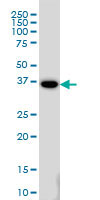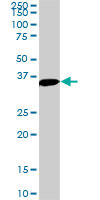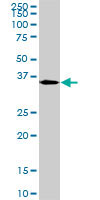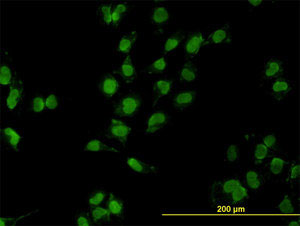GAX / MEOX2 Antibody (clone 6A5)
Mouse Monoclonal Antibody
- SPECIFICATION
- CITATIONS
- PROTOCOLS
- BACKGROUND

Application
| WB, IHC-P, IF, E |
|---|---|
| Primary Accession | P50222 |
| Reactivity | Human, Mouse, Rat |
| Host | Mouse |
| Clonality | Monoclonal |
| Clone Names | 6A5 |
| Calculated MW | 34kDa |
| Dilution | IF (10 µg/ml), IHC-P (5 µg/ml), WB (1:500-1:1000) |
| Gene ID | 4223 |
|---|---|
| Other Names | Homeobox protein MOX-2, Growth arrest-specific homeobox, Mesenchyme homeobox 2, MEOX2, GAX, MOX2 |
| Target/Specificity | Human Homeobox Protein Mox-2 |
| Reconstitution & Storage | Short term 4°C, long term aliquot and store at -20°C, avoid freeze thaw cycles. |
| Precautions | GAX / MEOX2 Antibody (clone 6A5) is for research use only and not for use in diagnostic or therapeutic procedures. |
| Name | MEOX2 {ECO:0000303|PubMed:16335786, ECO:0000312|HGNC:HGNC:7014} |
|---|---|
| Function | Mesodermal transcription factor that plays a key role in somitogenesis and somitogenesis and limb muscle differentiation (By similarity). Required during limb development for normal appendicular muscle formation and for the normal regulation of myogenic genes (By similarity). May have a regulatory role when quiescent vascular smooth muscle cells reenter the cell cycle (By similarity). Also acts as a negative regulator of angiogenesis (PubMed:17074759, PubMed:20516212, PubMed:22206000). Activates expression of CDKN1A and CDKN2A in endothelial cells, acting as a regulator of vascular cell proliferation (PubMed:17074759, PubMed:22206000). While it activates CDKN1A in a DNA- dependent manner, it activates CDKN2A in a DNA-independent manner (PubMed:22206000). Together with TCF15, regulates transcription in heart endothelial cells to regulate fatty acid transport across heart endothelial cells (By similarity). |
| Cellular Location | Nucleus. Nucleus speckle |

Thousands of laboratories across the world have published research that depended on the performance of antibodies from Abcepta to advance their research. Check out links to articles that cite our products in major peer-reviewed journals, organized by research category.
info@abcepta.com, and receive a free "I Love Antibodies" mug.
Provided below are standard protocols that you may find useful for product applications.
Background
Mesodermal transcription factor that plays a key role in somitogenesis and is required for sclerotome development (By similarity). Activates expression of CDKN1A and CDKN2A in endothelial cells, acting as a regulator of vascular cell proliferation. While it activates CDKN1A in a DNA-dependent manner, it activates CDKN2A in a DNA-independent manner (PubMed:22206000). May have a regulatory role when quiescent vascular smooth muscle cells reenter the cell cycle.
References
Grigoriou M.,et al.Genomics 26:550-555(1995).
Lepage D.F.,et al.Genomics 24:535-540(1994).
Ota T.,et al.Nat. Genet. 36:40-45(2004).
Hillier L.W.,et al.Nature 424:157-164(2003).
Lin J.,et al.Mol. Cell. Biochem. 275:75-84(2005).
If you have used an Abcepta product and would like to share how it has performed, please click on the "Submit Review" button and provide the requested information. Our staff will examine and post your review and contact you if needed.
If you have any additional inquiries please email technical services at tech@abcepta.com.













 Foundational characteristics of cancer include proliferation, angiogenesis, migration, evasion of apoptosis, and cellular immortality. Find key markers for these cellular processes and antibodies to detect them.
Foundational characteristics of cancer include proliferation, angiogenesis, migration, evasion of apoptosis, and cellular immortality. Find key markers for these cellular processes and antibodies to detect them. The SUMOplot™ Analysis Program predicts and scores sumoylation sites in your protein. SUMOylation is a post-translational modification involved in various cellular processes, such as nuclear-cytosolic transport, transcriptional regulation, apoptosis, protein stability, response to stress, and progression through the cell cycle.
The SUMOplot™ Analysis Program predicts and scores sumoylation sites in your protein. SUMOylation is a post-translational modification involved in various cellular processes, such as nuclear-cytosolic transport, transcriptional regulation, apoptosis, protein stability, response to stress, and progression through the cell cycle. The Autophagy Receptor Motif Plotter predicts and scores autophagy receptor binding sites in your protein. Identifying proteins connected to this pathway is critical to understanding the role of autophagy in physiological as well as pathological processes such as development, differentiation, neurodegenerative diseases, stress, infection, and cancer.
The Autophagy Receptor Motif Plotter predicts and scores autophagy receptor binding sites in your protein. Identifying proteins connected to this pathway is critical to understanding the role of autophagy in physiological as well as pathological processes such as development, differentiation, neurodegenerative diseases, stress, infection, and cancer.





